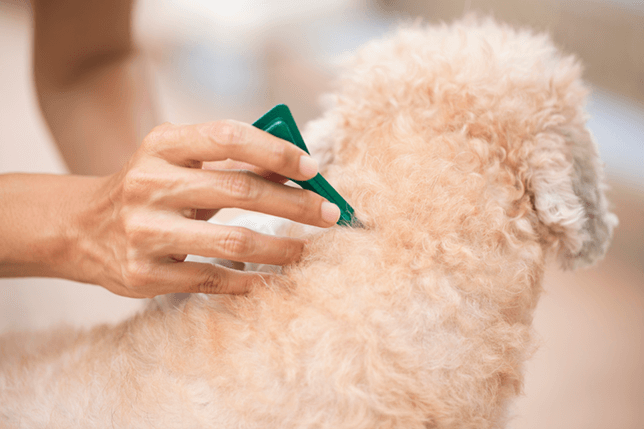20th January 2022
A guide to flea and worm treatment in dogs
Bringing a new furry family member home is an exciting experience for the whole household!
Pets, especially dogs and cats, require regular flea and worm treatments to protect them from parasites so they can stay happy and healthy.
In this guide, we’ve shared all you need to know about flea and worm treatment for dogs.
How often do dogs need to be treated for fleas and worms?
During your dog’s first visit to the vet, you’ll receive lots of support and advice about:
- Vaccinations
- Microchipping
- Flea treatment
- Worm treatment
- Feeding them correctly
- Spaying or neutering.
There are lots of flea and worm treatments available that are aimed at dealing with specific types of fleas and worms. So, your vet will let you know how often your pet needs to be treated for fleas and worms, as well as recommending the right flea and worm treatments for your dog.

Flea treatment for dogs
As one of the biggest health concerns for pet parents, fleas can cause problems for your dog if you aren’t using vet-approved preventative treatments.
The most common signs of fleas in dogs are:
- Excessive itching
- Biting their own skin
- Hair loss
- Visible eggs on the fur
Flea infestation can cause extreme itching in dogs, increasing the risk of tearing or damaging their skin. This excessive itching could cause bacterial infections which, in extreme circumstances, could pose a long-term threat to your dog’s health.
Always speak to your vet if you’re concerned your pet may have caught fleas!
Types of dog flea treatment
If you suspect that your dog has fleas, you should give them a vet-approved flea treatment as soon as possible. There are many different types of dog flea treatments available, with the most popular being:
- Drops
- Collars
- Tablets
- Sprays.
To completely remove fleas from your home, carry out a deep-clean; your vet should be able to advise about pet-safe cleaning products. Following this, flea treatments should be given routinely to prevent a flea infestation from returning.
How often should you flea a puppy?
Fleas can be a problem for puppies throughout the year. So, it’s important to treat your puppy for fleas using a vet-approved flea treatment (that’s safe for puppies!) once every four weeks, according to your vet’s advice.
It’s always worth speaking to your vet about the frequency and type of flea treatment that’s most suitable for your puppy’s individual needs.
Worming treatments for dogs
You should also be aware of worms in dogs; a type of parasite that lives within your pet’s intestines. Lungworms, tapeworms and hookworms can grow rapidly when your dog eats something containing the parasite or its eggs. New-born puppies can also catch worms from their mother.
Some of the symptoms of worms in dogs can include:
- Diarrhoea
- Vomiting
- Extreme coughing
- Hunger
- Lethargy or unusual tiredness
- Weakness
- Weight loss
- bloated stomach or "pot belly"
- Worms in their poo
- Worms in their vomit.
If you think your dog might have worms, contact your vet immediately.
Because worms in dogs can be passed to other animals, and their human friends, you should take extra care to prevent your dog from getting worms!
Wormers for dogs are available as injections, tablets, or spot-on treatments. However, you should always ask your vet’s advice about the right type of worming treatment for your canine companion, as well as finding out the frequency with which you should be worming your dog.
Looking for more dog advice?
Find the information you need as we support you through every step of your journey with your canine companion.
Need dog insurance?
Dog insurance can help cover the cost of veterinary treatment if your dog gets injured or falls ill.
We know pets
Our pets are part of the family. To achieve our vision of a better future for pets everywhere, we work with our partners, vets, and other veterinary professionals who are pioneering the latest advancements in animal care. Our campaigns, articles, and events are crafted to support, educate, and celebrate pet owners, while our policies are designed to provide peace of mind at an affordable price.
Yet our policies don’t just protect against the unexpected – they have purpose, too.
Since we were founded over 25 years ago, we've provided industry-leading policies that protect the nation’s pets, while also making a difference to animal welfare and our planet. Thanks to you, our policyholders, we've donated over £9 million to more than 830 animal welfare charities and conservancies, helping to support vulnerable pets and wildlife around the world.
We’re proud to be wildly different. Are you?
